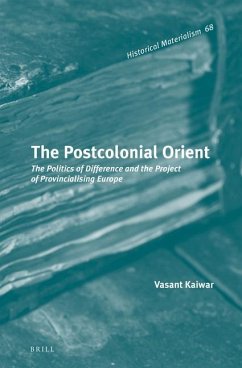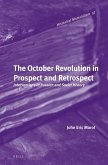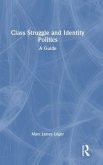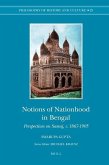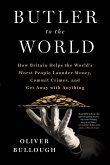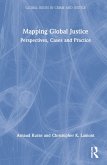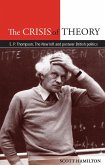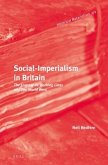Vasant Kaiwar
The Postcolonial Orient
The Politics of Difference and the Project of Provincialising Europe
Vasant Kaiwar
The Postcolonial Orient
The Politics of Difference and the Project of Provincialising Europe
- Gebundenes Buch
- Merkliste
- Auf die Merkliste
- Bewerten Bewerten
- Teilen
- Produkt teilen
- Produkterinnerung
- Produkterinnerung
In The Postcolonial Orient, Vasant Kaiwar analyses the formation of postcolonial studies around the 1989 moment of world history, shows its limitations via an engagement with Marxism, and provides an alternative, enriched account of interpretive possibilities inherent in the moment.
Andere Kunden interessierten sich auch für
![The October Revolution in Prospect and Retrospect The October Revolution in Prospect and Retrospect]() John E. MarotThe October Revolution in Prospect and Retrospect182,99 €
John E. MarotThe October Revolution in Prospect and Retrospect182,99 €![Class Struggle and Identity Politics Class Struggle and Identity Politics]() Marc James LégerClass Struggle and Identity Politics183,99 €
Marc James LégerClass Struggle and Identity Politics183,99 €![Notions of Nationhood in Bengal: Perspectives on Samaj, C. 1867-1905 Notions of Nationhood in Bengal: Perspectives on Samaj, C. 1867-1905]() Swarupa GuptaNotions of Nationhood in Bengal: Perspectives on Samaj, C. 1867-1905202,99 €
Swarupa GuptaNotions of Nationhood in Bengal: Perspectives on Samaj, C. 1867-1905202,99 €![Butler to the World Butler to the World]() Oliver BulloughButler to the World26,99 €
Oliver BulloughButler to the World26,99 €![Mapping Global Justice Mapping Global Justice]() Arnaud KurzeMapping Global Justice181,99 €
Arnaud KurzeMapping Global Justice181,99 €![The Crisis of Theory The Crisis of Theory]() Scott HamiltonThe Crisis of Theory153,99 €
Scott HamiltonThe Crisis of Theory153,99 €![Social-Imperialism in Britain Social-Imperialism in Britain]() Neil RedfernSocial-Imperialism in Britain189,99 €
Neil RedfernSocial-Imperialism in Britain189,99 €-
-
-
In The Postcolonial Orient, Vasant Kaiwar analyses the formation of postcolonial studies around the 1989 moment of world history, shows its limitations via an engagement with Marxism, and provides an alternative, enriched account of interpretive possibilities inherent in the moment.
Hinweis: Dieser Artikel kann nur an eine deutsche Lieferadresse ausgeliefert werden.
Hinweis: Dieser Artikel kann nur an eine deutsche Lieferadresse ausgeliefert werden.
Produktdetails
- Produktdetails
- Verlag: Brill
- Seitenzahl: 436
- Erscheinungstermin: 15. Mai 2014
- Englisch
- Abmessung: 239mm x 157mm x 28mm
- Gewicht: 798g
- ISBN-13: 9789004231863
- ISBN-10: 9004231862
- Artikelnr.: 40790809
- Herstellerkennzeichnung
- Libri GmbH
- Europaallee 1
- 36244 Bad Hersfeld
- 06621 890
- Verlag: Brill
- Seitenzahl: 436
- Erscheinungstermin: 15. Mai 2014
- Englisch
- Abmessung: 239mm x 157mm x 28mm
- Gewicht: 798g
- ISBN-13: 9789004231863
- ISBN-10: 9004231862
- Artikelnr.: 40790809
- Herstellerkennzeichnung
- Libri GmbH
- Europaallee 1
- 36244 Bad Hersfeld
- 06621 890
Vasant Kaiwar, (Ph.D. UCLA, 1989), Visiting Associate Professor of History, Duke University; founder-editor, South Asia Bulletin (1981-93) and Comparative Studies of South Asia, Africa, and the Middle East (1993-2002); and co-editor, Antinomies of Modernity (2003) and From Orientalism to Postcolonialism (2009).
Acknowledgements
Preface
1 Introduction
1.1 A narrative of arrival
1.2 1989 and all that
1.3 Postcolonial difference
2 Situating Postcolonial Studies
2.1 Definitions: Colonialism, for example
2.2 Postcolonial modernisation
2.3 Postcolonial populism
2.4 Subaltern Studies
3 Colonialism, Modernity, Postcolonialism
3.1 Colonialism and modernity in a postcolonial framing
3.2 History's ironic reversals
3.3 Who is the 'subaltern' in postcolonial studies?
4 Provincialising Europe or Exoticising India? Towards a Historical and
Categorial Critique of Postcolonial Studies
4.1 Marx and difference in Provincialising Europe
4.2 The not-yet of historicism
4.3 Why historicise?
4.4 Tattooed by the exotic
4.5 Under the sign of Heidegger, I: The woman's question
4.6 Under the sign of Heidegger, II: Imagined communities
4.7 Lack/inadequacy or plenitude/creativity?
4.8 Dominance without hegemony: Historicism by another name?
4.9 The constituent elements of colonial modernity
4.10 Modernity as class struggle
4.11 Orientalism and nativism
4.12 Bahubol and the Muslim question
5 Uses and Abuses of Marx
5.1 Abstract labour, difference, History I and II
5.2 The piano maker and the piano player: Productive and unproductive
labour
5.3 Millennial toil as the 'nightmare of history'
5.4 'Bourgeois hegemony' and colonial rule
5.5 Modernity in the 'fullest sense'
5.6 Beyond the bourgeois revolution? Hegemony revisited
5.7 The historic moment of colonial dominance in India
5.8 A 'liberation from blinding bondage', or the question of historicism
5.9 Marxism and historicism
6 The Postcolonial Orient
6.1 The play of difference, the merchandising of the exotic, tradition and
neo-traditionalism
6.2 The non-commissioned officers
6.3 The Orient as 'vanishing mediator'
6.4 The unrenounceable project
6.5 Provincialising Europe
References
Ind
Preface
1 Introduction
1.1 A narrative of arrival
1.2 1989 and all that
1.3 Postcolonial difference
2 Situating Postcolonial Studies
2.1 Definitions: Colonialism, for example
2.2 Postcolonial modernisation
2.3 Postcolonial populism
2.4 Subaltern Studies
3 Colonialism, Modernity, Postcolonialism
3.1 Colonialism and modernity in a postcolonial framing
3.2 History's ironic reversals
3.3 Who is the 'subaltern' in postcolonial studies?
4 Provincialising Europe or Exoticising India? Towards a Historical and
Categorial Critique of Postcolonial Studies
4.1 Marx and difference in Provincialising Europe
4.2 The not-yet of historicism
4.3 Why historicise?
4.4 Tattooed by the exotic
4.5 Under the sign of Heidegger, I: The woman's question
4.6 Under the sign of Heidegger, II: Imagined communities
4.7 Lack/inadequacy or plenitude/creativity?
4.8 Dominance without hegemony: Historicism by another name?
4.9 The constituent elements of colonial modernity
4.10 Modernity as class struggle
4.11 Orientalism and nativism
4.12 Bahubol and the Muslim question
5 Uses and Abuses of Marx
5.1 Abstract labour, difference, History I and II
5.2 The piano maker and the piano player: Productive and unproductive
labour
5.3 Millennial toil as the 'nightmare of history'
5.4 'Bourgeois hegemony' and colonial rule
5.5 Modernity in the 'fullest sense'
5.6 Beyond the bourgeois revolution? Hegemony revisited
5.7 The historic moment of colonial dominance in India
5.8 A 'liberation from blinding bondage', or the question of historicism
5.9 Marxism and historicism
6 The Postcolonial Orient
6.1 The play of difference, the merchandising of the exotic, tradition and
neo-traditionalism
6.2 The non-commissioned officers
6.3 The Orient as 'vanishing mediator'
6.4 The unrenounceable project
6.5 Provincialising Europe
References
Ind
Acknowledgements
Preface
1 Introduction
1.1 A narrative of arrival
1.2 1989 and all that
1.3 Postcolonial difference
2 Situating Postcolonial Studies
2.1 Definitions: Colonialism, for example
2.2 Postcolonial modernisation
2.3 Postcolonial populism
2.4 Subaltern Studies
3 Colonialism, Modernity, Postcolonialism
3.1 Colonialism and modernity in a postcolonial framing
3.2 History's ironic reversals
3.3 Who is the 'subaltern' in postcolonial studies?
4 Provincialising Europe or Exoticising India? Towards a Historical and
Categorial Critique of Postcolonial Studies
4.1 Marx and difference in Provincialising Europe
4.2 The not-yet of historicism
4.3 Why historicise?
4.4 Tattooed by the exotic
4.5 Under the sign of Heidegger, I: The woman's question
4.6 Under the sign of Heidegger, II: Imagined communities
4.7 Lack/inadequacy or plenitude/creativity?
4.8 Dominance without hegemony: Historicism by another name?
4.9 The constituent elements of colonial modernity
4.10 Modernity as class struggle
4.11 Orientalism and nativism
4.12 Bahubol and the Muslim question
5 Uses and Abuses of Marx
5.1 Abstract labour, difference, History I and II
5.2 The piano maker and the piano player: Productive and unproductive
labour
5.3 Millennial toil as the 'nightmare of history'
5.4 'Bourgeois hegemony' and colonial rule
5.5 Modernity in the 'fullest sense'
5.6 Beyond the bourgeois revolution? Hegemony revisited
5.7 The historic moment of colonial dominance in India
5.8 A 'liberation from blinding bondage', or the question of historicism
5.9 Marxism and historicism
6 The Postcolonial Orient
6.1 The play of difference, the merchandising of the exotic, tradition and
neo-traditionalism
6.2 The non-commissioned officers
6.3 The Orient as 'vanishing mediator'
6.4 The unrenounceable project
6.5 Provincialising Europe
References
Ind
Preface
1 Introduction
1.1 A narrative of arrival
1.2 1989 and all that
1.3 Postcolonial difference
2 Situating Postcolonial Studies
2.1 Definitions: Colonialism, for example
2.2 Postcolonial modernisation
2.3 Postcolonial populism
2.4 Subaltern Studies
3 Colonialism, Modernity, Postcolonialism
3.1 Colonialism and modernity in a postcolonial framing
3.2 History's ironic reversals
3.3 Who is the 'subaltern' in postcolonial studies?
4 Provincialising Europe or Exoticising India? Towards a Historical and
Categorial Critique of Postcolonial Studies
4.1 Marx and difference in Provincialising Europe
4.2 The not-yet of historicism
4.3 Why historicise?
4.4 Tattooed by the exotic
4.5 Under the sign of Heidegger, I: The woman's question
4.6 Under the sign of Heidegger, II: Imagined communities
4.7 Lack/inadequacy or plenitude/creativity?
4.8 Dominance without hegemony: Historicism by another name?
4.9 The constituent elements of colonial modernity
4.10 Modernity as class struggle
4.11 Orientalism and nativism
4.12 Bahubol and the Muslim question
5 Uses and Abuses of Marx
5.1 Abstract labour, difference, History I and II
5.2 The piano maker and the piano player: Productive and unproductive
labour
5.3 Millennial toil as the 'nightmare of history'
5.4 'Bourgeois hegemony' and colonial rule
5.5 Modernity in the 'fullest sense'
5.6 Beyond the bourgeois revolution? Hegemony revisited
5.7 The historic moment of colonial dominance in India
5.8 A 'liberation from blinding bondage', or the question of historicism
5.9 Marxism and historicism
6 The Postcolonial Orient
6.1 The play of difference, the merchandising of the exotic, tradition and
neo-traditionalism
6.2 The non-commissioned officers
6.3 The Orient as 'vanishing mediator'
6.4 The unrenounceable project
6.5 Provincialising Europe
References
Ind

